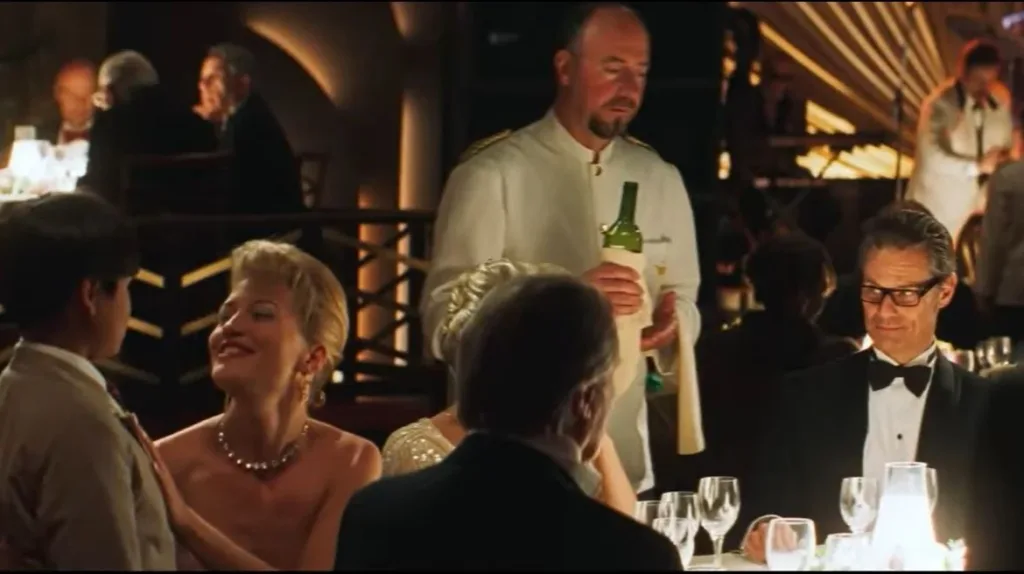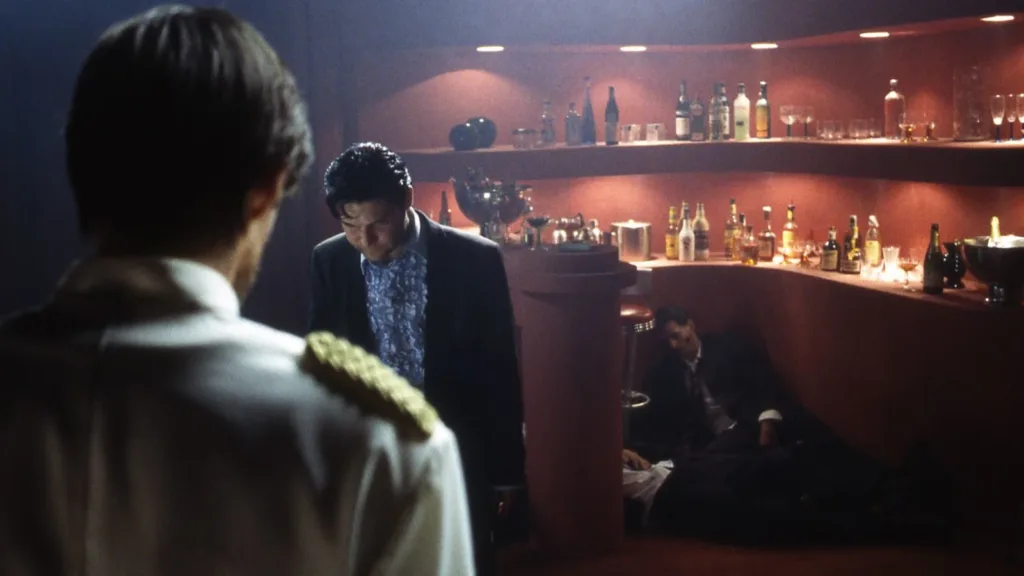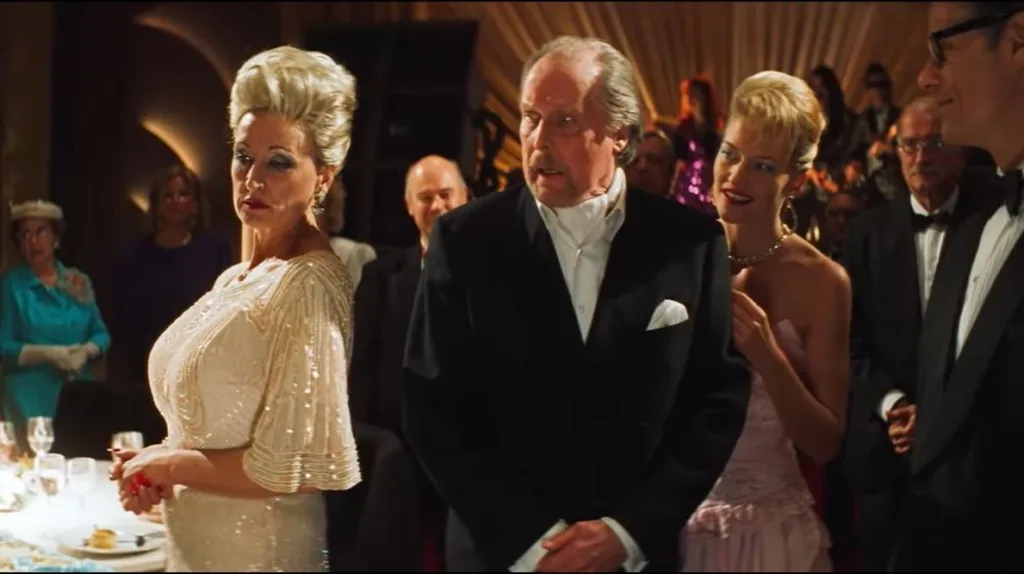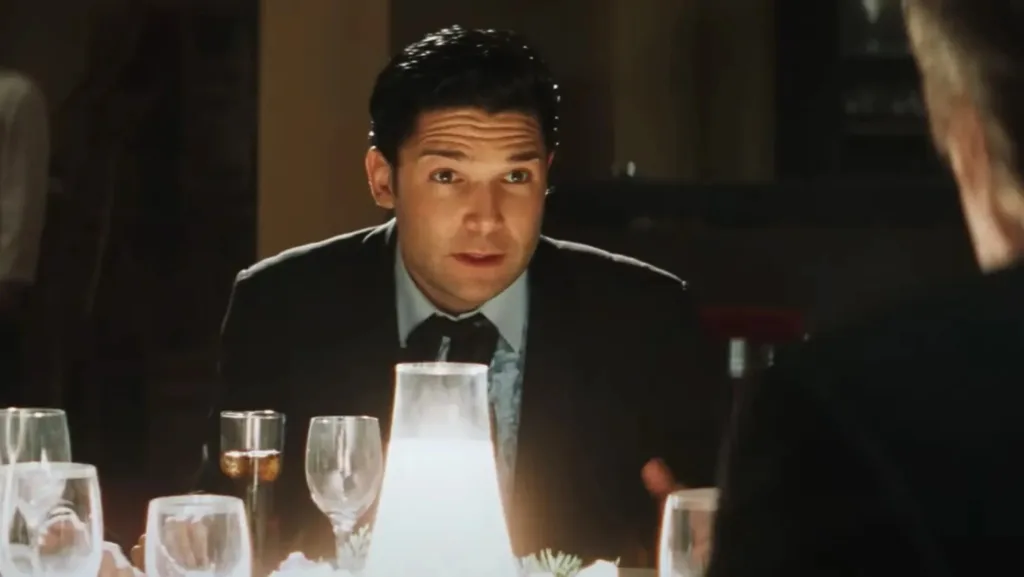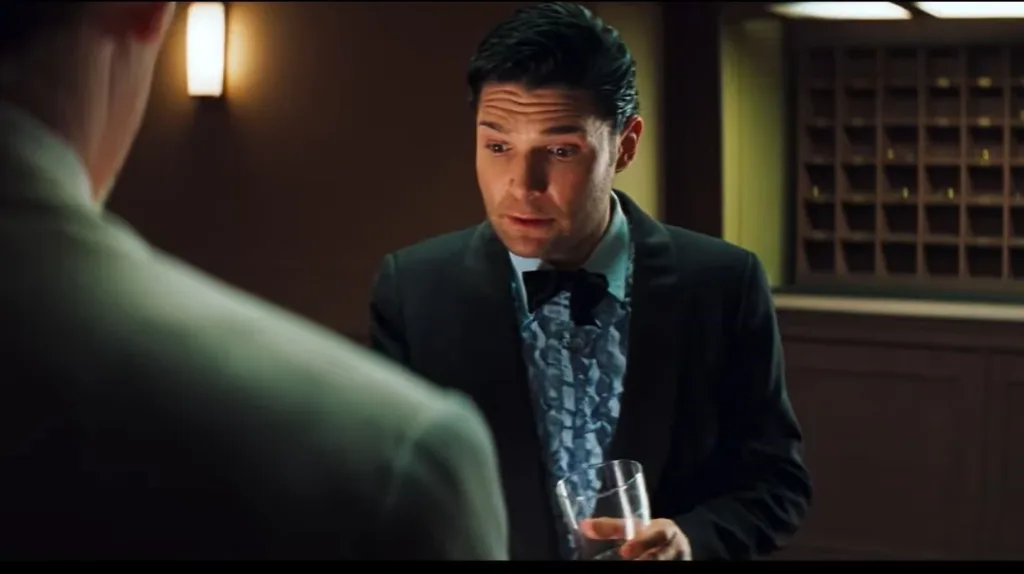The Birthday takes us inside a lavish hotel where one fateful night will descend into madness. At the centre of the strange events is Corey Feldman, playing the awkward Norman who has come to meet his girlfriend’s wealthy father for his birthday celebration. Behind its familiar premise, this Spanish film proves to be like no other.
Directed by Eugenio Mira in his feature debut, it blends genres in dizzying ways to deliver cult frights through surrealistic means. Over the course of the evening, hidden secrets will emerge and Norman will find himself fighting for his life against unknown forces.
While the movie brought little attention at first, word of mouth has built fervor for its daring experimentation. Let’s delve into the dizzying world that awaits within the walls of this bizarre hotel.
A Blend of Genres and a Pervasive Sense of Dread
This film is truly hard to define, effortlessly shifting between genres to keep you constantly unbalanced. While it begins as a bizarre comedy of errors, set within the lavish yet eerie confines of a grand hotel, The Birthday gradually morphs into something far more unsettling.
Eugenio Mira seamlessly blends elements of thriller, horror and dark comedy. The story starts innocently enough, with Norman hoping to impress his girlfriend’s wealthy family. But unusual events and awkward social situations soon give way to a growing sense of unease. Strange orders are barked by staff, and cryptic secrets seem shrouded within the hotel’s ornate walls.
Yet the comedy remains, lending absurdity to awkward encounters. This creates a truly disorienting effect, with laughs swiftly followed by a jolt of horror. One moment playful banter, the next a lurking dread just beneath the surface. This fusion becomes increasingly surreal and nightmarish as mysteries proliferate.
The dystopian atmosphere is palpable. Barren hallways and the looming danger of some unknown threat heighten Norman’s paranoia alongside our own. Unfamiliar surroundings take on a sinister edge in the flickering light. Mira uses every tool to tighten the screws of unease, from unhinged performances to unsettling shadows and swelling strains of unnerving sound.
By pulling viewers continuously off-kilter, this peculiar blend of tones and expectations keeps the sense of peril fresh. Just when laughs seem safest, a new threat lurches into view. In splicing genres together with subtlety, The Birthday delivers cult frights that continue disturbing long after leaving its disorienting realm.
A Vision Emerging
At the helm of this bizarre journey was Eugenio Mira, setting forth with a strikingly ambitious debut. Through lushly stylized visuals and a daring narrative blend, his nascent talents shone with real flair.
Mira forged a retro world all his own. Cinematography in rich burnt ochres and intricate decadent sets teleported viewers right back to cult classics of the 1970s. The Birthday’s hotel acted as its own character – a decaying yet ornate labyrinth trapping poor Norman within. These textured frames mirrored that deteriorating mental state.
Cinematic DNA from iconic peers also filtered through. David Lynch’s nightmarish unease crept within dim corridors. Like Barton Fink, its hotel harboured incomprehensible secrets. References also nodded to Cronenberg’s body horror and Lovecraft’s nameless dread.
Weaving such diverse threads could have unravelled in incoherency. Instead, they merged seamlessly into a singular surreal story. Mirrored in Mira’s unhinged narrative, genres and references blended naturally into the whole. Though still honing his voice, a true directorial flair emerged.
While some plot points grew confusing, Miras’ talents shone through. Through visuals alone he conjured an atmosphere of inexplicable weirdness and growing terror. An unpolished auteur evolved before viewers’ eyes, guiding them into realms of madness and emotion with real panache. Unafraid to experiment wildly, Mira delivered cult cinema it seems almost criminal remained hidden for so long. His debut burst with a fresh and febrile vision, one deserving far greater recognition.
Corey Feldman’s Fearless Anchor
This bizarre dream world found its beating heart in Corey Feldman’s mesmerizing turn as Norman. Shouldering the camera’s fierce focus, he delivered raw nerve and wit in equal measure.
Feldman burrowed deep into Norman’s neuroses. Every taut gesture and jolting tic exposed the character’s spiraling fear and frailty. Like a livewire sparking constantly, Norman electrified each scene with visceral social awkwardness. Yet beneath lay reservoirs of empathy and passion scarring to release.
It’s a testament to Feldman’s skill that such an anxious soul felt utterly lifelike. Mimicking Jerry Lewis’ manic energy, he endowed Norman with pathos and humor in the same flutter. Never once did the performance strain credulity, even as nightmares ripped through the hotel. Instead, he remained the steady emotional core grasping at reason among the developing chaos.
Subtly, beneath panic, his eyes conveyed wells of quiet resilience. Though trembling, Norman stood his ground against the terrors descending. In these moments, Feldman’s focused ferocity cuts through to raw instincts of survival. It’s a nuanced tightrope walked flawlessly.
Ultimately, Feldman’s singular vision for the character defined the film’s soul. His raw lead magnetized viewers into The Birthday’s disorienting thrall, guiding us with empathy on the hero’s harrowing journey. That he managed to anchor such an abstract narrative entirely on his talents remains a marvel. A cult work was granted its pulsating heart through one of Feldman’s most unforgettable portraits.
Scene Stealing Support
While the film centered on Feldman, rich supporting players enriched its bizarre tapestry. Erica Prior brought pathos to Norman’s girlfriend, her fleeting affection playing on his unraveling nerves. Meanwhile, Jack Taylor was chillingly severe as the father – an icy robot harbouring shadows of his own.
Some cast borders verged on the unintentionally absurd. Yet within this off-kilter world, such loose canons fit like missing jigsaw pieces. The whole took on Glorious’ tone of delirious disarray.
Among the most memorable was Richard Felix’s waiter Theodore. Barked orders masked deeper motives as this character crept to the plot’s dark heart. His sharp interjections propelled the cult revelations, further stretching Norman’s frayed stability.
While uneven at times, a strength of the ensemble lay in committed embraces of each wild character. Minor roles blazed with brazen eccentricity, enriching the dizzying whole. Contrasting extremes blended seamlessly, like colours smearing to form surreal portraits both hilarious and haunting.
Through such vivid brushstrokes, Mira fleshed out an unforgettably disturbed menagerie. Within their bursting performances resided cult cinema allure that still leaves its indelible mark. Supporting turns just as vital as the anchor, each brought madness closer to the brink.
A Scream in the Dark
This twisted tale crept under the skin through visceral slow-build. Mira crafted a smothering sense of unease within the hotel’s confines, losing viewers deeper in disorienting premises with each scene.
Norman’s paranoia seeped into our own as mysteries piled higher. Whispers lurked around every corner of the ornate yet unnerving halls. An atmosphere darker than any nightmare swallowed the room whole. Terror tingled at the nape, though of what we could not say.
Just when tangled strains of comedy seemed safest relief, a sickening lurch dragged us back into the void. Horror ruptured through in a cascade of crazed revelations. Cultists schemed chaos as an unspeakable presence sought rebirth within the walls bearing down.
The madness hurtled towards its horrific zenith at a convulsive pace. Twists ricocheted off mirrors of deceit and doubling dreams. Logic spiraled down the plughole as psychic fractures split wide. Yet amid the sensory assault, viewers remained glue to the screen, transfixed by the sensory thrills.
Finally at the apex, all restraint shattered. Sound and image collided in a deranged showcase of fearsome prowess. A night for the history books unleashed its unholy cacophony upon the world in a firestorm of creative daring. Through sheer creative balls, Mira left an indelible mark of genius in psychosis’ aftermath. Films aspire to such climaxes but rarely achieve the unhinged perfection here exhibited in its closing seconds. A scream in the dark that still echoes strong.
An Experience to Get Lost In
Eugenio Mira crafted a one-of-a-kind cinematic odyssey with The Birthday that deserves celebrated among cult classics. Through its bizarre blend of tones and visual flair, the film plunges viewers into true surreal madness.
At the centre of the maelstrom stands Corey Feldman, delivering a performance that alone merits the price of admission. His rawness and nuance grant audiences a tour guide into this disorienting realm.
After drifting in obscurity for decades, its re-emergence offers a chance to discover this twisted gem. Watching its mystery and unease unfold makes for a truly singular experience. One feels swallowed into the bowels of Mira’s deranged imagination.
It’s a trip like no other, equal parts hilarious and haunting. Even as the plot spirals towards incomprehensibility, its gonzo spirit stays infectious. The Birthday leaves an imprint, a contact high not soon shaken.
Curiosity seekers looking past convention will find cult cinema bliss awaiting. For those embracing the weird, the rewards are plentiful. This is a midnight movie worthwhile losing yourself within.
The Review
The Birthday
The Birthday is a singular cinematic odyssey that pays testament to the boundless potential of cult cinema. Director Eugenio Mira's deranged debut effort conjures a nightmarish atmosphere through its dystopian setting and off-kilter melding of genres. At the heart of the chaos lies Corey Feldman, delivering a tour-de-force performance that anchors the entire film's surreal voyage. Though narrative coherence wanes in its backend, The Birthday still succeeds in transporting viewers to a world unlike any other through its sheer creative madness. Nearly two decades after its initial limited release, it remains well worth rediscovering for adventurous fans of provocative midnight movies.
PROS
- Unique blend of genres keeps viewers constantly unbalanced
- Atmospheric setting and cinematography fully immerse viewers
- Corey Feldman's intense central performance
- Surrealism and nightmarish tone create cult appeal
- Ambitious directorial debut from Eugenio Mira
CONS
- Narrative coherence falters in second half
- Some supporting performances uneven
- Confusing plot points lack resolution









































